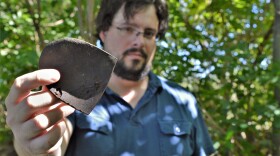
The Environment Report
The Environment Report, hosted by Lester Graham, explores the relationship between the natural world and the everyday lives of people in Michigan.
-
The H2Ohio Wetland Monitoring Program is hoping to get people to take photos for a time-lapse of developing wetlands, and then get more involved as citizen scientists.
-
A new study in the journal Global Change Biology studied a pessimistic policy outlook and an optimistic policy outlook to project how climate change would affect birds in the neotropics, stretching from central Mexico to the southern tip of South America.
-
Game managers say there are too many deer in parts of the state’s Lower Peninsula. The Michigan Natural Resources Commission has added days to the deer hunting season.
-
The state is trading mineral rights to more than 8,000 acres in the Porcupine Mountains for mineral rights on land scattered across six Upper Peninsula counties.
-
A study in the journal Science outlines the many consequences of the loss of ice on lakes because of climate change. Fishing, cultural activities, transportation, water quality, and greenhouse gas releases are all consequences of the loss of lake ice coverage.
-
Michigan faces a high risk of fires. Abnormally dry conditions, and in some places actual drought, have left yards and fields dry. Winds this weekend increase the chance of wildfires.
-
Baby boomers are part of a "silver tsunami" of retirements sweeping across the nation's drinking water and wastewater systems.
-
Enbridge wants to build a new 41-mile section of pipeline to take Line 5 around the Bad River Band of Lake Superior Chippewa reservation. Opponents want Line 5 shut down.
-
The U.S. EPA announced four tribes in Michigan would receive grants to install renewable energy infrastructure to reduce greenhouse gas emissions.
-
University of Michigan economists say Michigan's economy will strengthen once the Federal Reserve begins to lower interest rates.
-
State agencies in Michigan have issued a ‘Do Not Eat’ advisory for deer in Oscoda Township near the closed Wurtsmith Air Force Base.The state tested deer…
-
The State of Michigan is finding industrial chemicals known as PFAS in the tissue of fish. So it's been issuing “Don’t Eat the Fish” advisories along…
-
UPDATE: This story was updated at 3:53 p.m.This week, the Environment Report is looking at industrial chemicals called per- and polyfluoralkyl substances…
-
This week, we’re looking at PFAS chemicals: they're industrial chemicals that have contaminated water sources around the state.PFAS chemicals are used to…
-
One of the contaminated PFAS sites first documented in Michigan was in Oscoda Township near the former Wurtsmith Air Force Base. The base has been closed…
-
There have been more news stories in recent months about water contamination from a group of industrial chemicals. PFAS chemical pollution seems to have…
-
In recent months, the State of Michigan has found several places where drinking water and fish are contaminated by a class of chemicals called PFAS. This…
-
Why this 2010 approval of a multi-million gallon Great Lakes water diversion is drawing new scrutinyWhen Peter Annin, director of the Burke Center for Freshwater Innovation at Northland College, was completing research for an updated version of his book…
-
Riding a bike to work might be good for the environment, but automobile drivers are still getting used to the idea of sharing the road. Bicycling to work…
-
The elk is an important Michigan symbol. It’s even on our state flag. But have you ever seen an elk in the wild in Michigan? Did you even know there are…




















